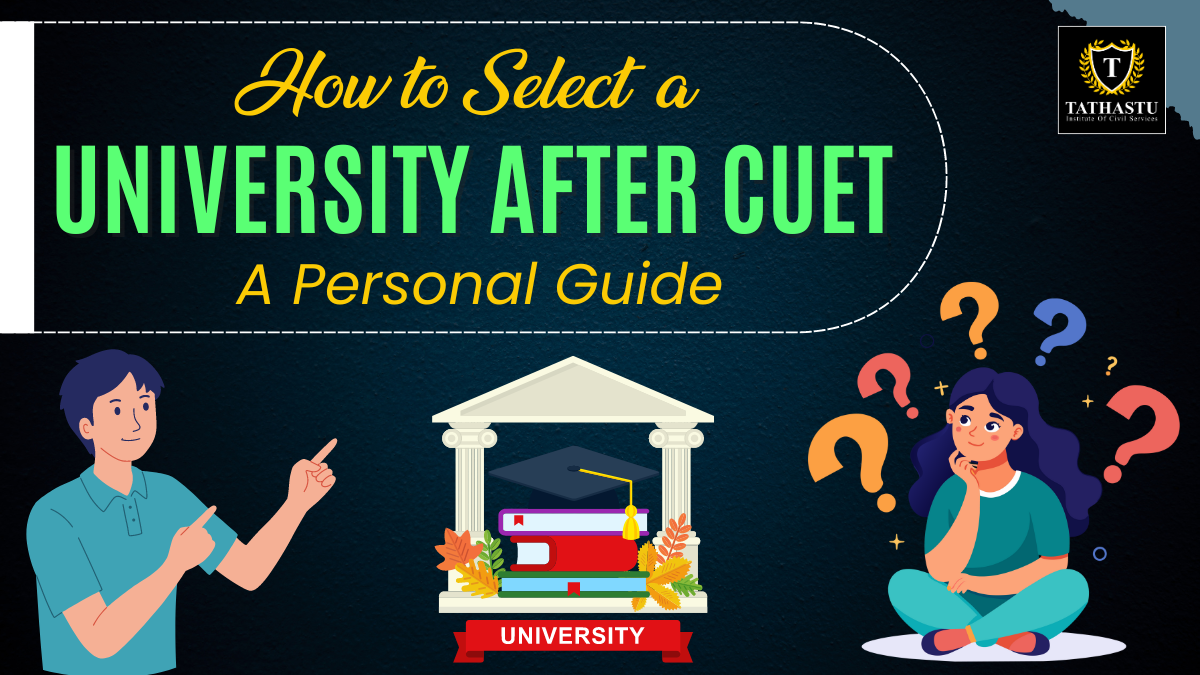Special Batch Available Morning & Evening
Click Here
"Education is the passport to the future, for tomorrow belongs to those who prepare for it today." - Malcolm X
Hey There! Congratulations on successfully appearing for the Common University Entrance Test (CUET). Now, it's time to choose the right university, one of the most important decisions you will ever make to keep your future bright. It can be challenging to choose a university with so many options available, where you'll need to evaluate various factors carefully before making your final choice. Therefore, In this blog, I will share some insights and tips, as well as a list of top universities, their rankings, and other relevant information that will help you in making an informed decision.
"Knowing yourself is the beginning of all wisdom." - Aristotle
Take some time to evaluate yourself before you start choosing a college. Think about your academic interests, career goals, strengths, and weaknesses. Ask yourself what kind of environment you want to live in and what are your priorities in terms of education and lifestyle. This self-awareness will help you filter your choices and focus on universities that align with your personal and professional aspirations.
Choosing a university isn't just about taking admission to complete a bachelor's degree. It's about finding a place that seems like an extension of yourself and your goals. Here are some essential considerations to consider after the self-assessment:
Cut-off Trends: Check out the deadlines from past years' results to get an idea of your chances. This can vary from one college to another.
Eligibility Requirements: Make sure you meet all the criteria for the course you’re interested in.
Course Availability: Now, make a list of universities that are offering the course or program you want to pursue. Check the curriculum, specializations, and elective options to see if they align with your career goals.
University Ranking: Look at the national and international rankings of the universities. Because rankings can give you an idea of the institution's reputation, faculty quality, and overall educational standards.
Accreditation: Ensure that the university is recognized by a certain standard of education and facilities bodies like UGC or NAAC.
Location: Consider the location of the university with your preferences, depending on whether you do better in a busy city or a calmer outdoorsy campus. The location can greatly impact your overall experience.
Infrastructure and Facilities: Check out the university's facilities, like its labs, libraries, sports facilities, and housing choices. These things are very important because they will supplement your academic and extracurricular activities.
Placement Records: Research the university’s placement statistics, the companies that recruit from the campus, and the average salary packages offered to graduates.
Benjamin Franklin once said, "An investment in knowledge pays the best interest." Therefore, a great placement record shows the institution's capacity to prepare students for successful professions.
Faculty: "The function of education is to teach one to think intensively and to think critically. Intelligence plus character – that is the goal of true education."
In essence, the quality and experience of the professors are essential. Learn about the teachers' credentials, research initiatives, and field experience, as they will have a significant impact on your learning.
Fee Structure: Evaluate the affordability of the university, including tuition fees, living costs, and potential financial aid opportunities. It is important to balance quality education with financial considerations for long-term stability.
Student Life: Explore the campus culture, student organizations, and extracurricular activities available. Because a vibrant student life leads to personal growth and enriches your university experience beyond academics.
Clubs and Societies: Universities often have various clubs and societies related to sports, arts, culture, technology, and more. Engaging in these activities can enhance your university experience.
Sports and Arts: If you are inclined towards sports or arts, then look for universities that provide good facilities and opportunities in these areas.
Here's a table summarizing the top universities mentioned earlier based on their rankings and key highlights:
University Name |
Ranking (NIRF 2023) |
Location |
Highlights |
|
University of Delhi (DU) |
1st |
New Delhi |
|
|
Jawaharlal Nehru University (JNU) |
2nd |
New Delhi |
|
|
Banaras Hindu University (BHU) |
3rd |
Varanasi |
|
|
University of Hyderabad (UoH) |
4th |
Hyderabad |
|
|
Jamia Millia Islamia (JMI) |
5th |
New Delhi |
|
These universities are well-known for their academic achievements, facilities, instructor quality, and overall student experience. Each has distinct qualities that appeal to a variety of academic and personal interests.
Remember, these are just a few examples! There are incredible universities across India yet to be discovered and for this, there are more tips:
Explore & Research: Research is key. Start with the basics, but also dig deeper. Go through university websites, social media pages, and online reviews.
Connect with Current Students: Reach out to current students via online forums or social media to get the real stories and experiences inside campus life.
Attend Virtual Events: Many universities host online info sessions and virtual tours. You can take advantage of these to get a feel for the university environment.
"The beautiful thing about learning is that no one can take it away from you."
Therefore, Don’t worry much! Take your time to explore your options, visit campuses, and seek advice from mentors and peers. Your university journey is a transformative experience, and choosing the right institution will set the stage for your successful future. I hope this will help you right in finding your best and Good luck with your university selection process!